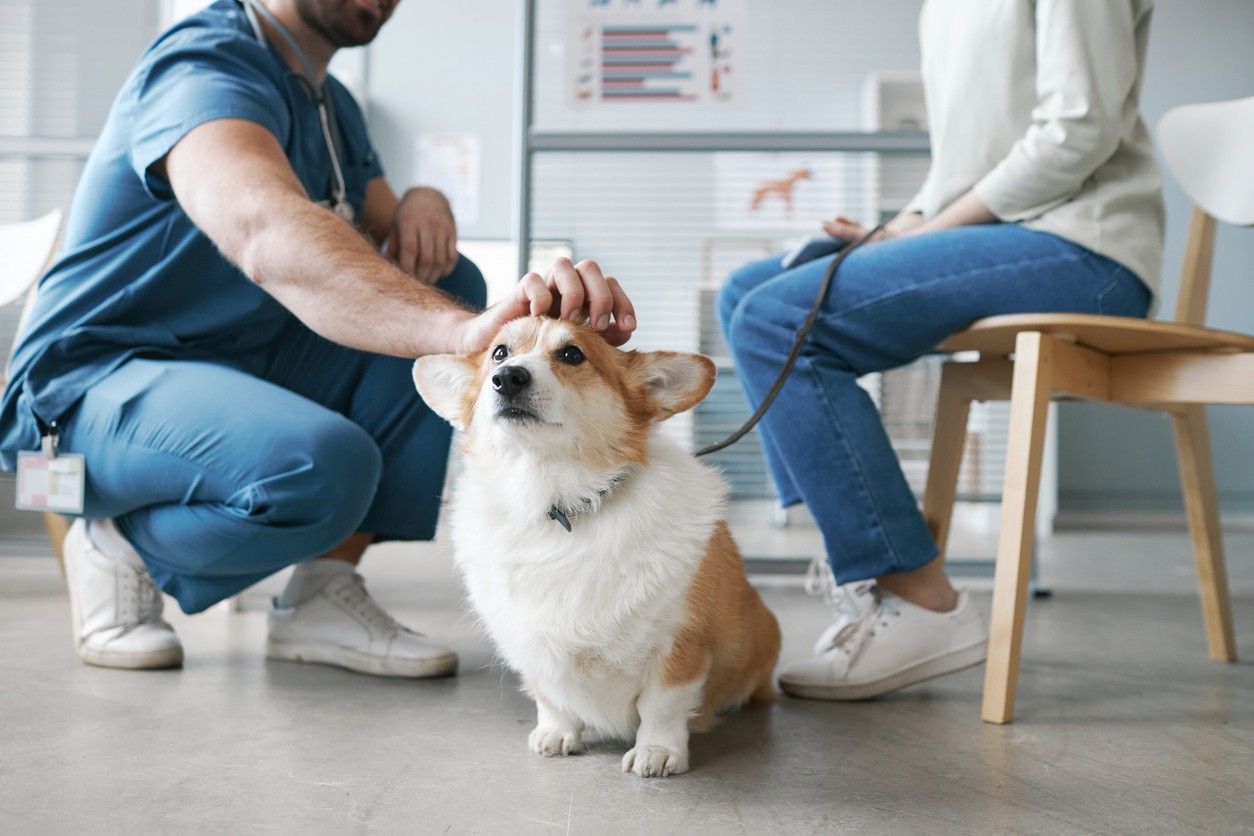Occasional coughing can be a normal reflex to an irritant in your dog’s airway, but persistent, harsh, or productive coughing can signal an underlying condition that needs veterinary attention. Here’s a closer look at the most common reasons dogs cough and recommendations that will help your dog breathe more easily.
What Does Coughing Sound like in Dogs?
Coughing in dogs can vary in sound and intensity and range from a slight rumble to an abrasive hacking or honking cough. Coughs can also be described as dry or wet and may be productive (i.e., producing mucus or phlegm) or non-productive. These variations are created by the cough’s origin—your pet’s upper or lower respiratory tract—and its underlying cause.
Common Reasons Why Dogs Cough and What You Can Do
Intense or persistent coughing in dogs is always a concern, especially if other illness signs, such as eye or nasal discharge, fever, vomiting, lethargy, or appetite loss, are present. If your dog’s coughing developed only recently, monitor them closely for additional signs or increasing frequency or intensity. While coughing can be a red flag for many potential illnesses, a mild, intermittent cough can be normal and harmless.
Common medical causes for coughing in dogs can include:
- Allergies and airborne irritants — Much like people, dogs can also suffer from environmental allergies, with the most common canine allergens including pollen, weeds, mold, and dust mites. When sensitive dogs are exposed to these allergens or other airborne irritants (e.g., smoke), the foreign particles activate the immune system, which creates inflammation and triggers a coughing reflex. Allergic dogs may also experience sneezing, itching, or watery eyes.
Although allergies have no known cure, many therapeutic options can reduce your dog’s clinical signs. Formal testing through a veterinary dermatologist is necessary to determine your dog’s specific allergies and create a targeted treatment plan.
- Airway abnormalities — Structural problems or conditions that affect your dog’s respiratory function can create resistance or irritation during airflow and cause a cough. Tracheal collapse is common among toy- and small-breed dogs. Affected dogs often cough when overexcited or when pulling on the leash. Laryngeal paralysis occurs in middle-aged or senior large- and giant-breed dogs. Dogs with laryngeal paralysis may experience not only a hoarse or honking cough, but also regurgitation, vomiting, noisy breathing, and changes in their bark.
Structural airway disorders require a veterinary diagnosis and may be managed medically (e.g., bronchodilator medications) or require surgical correction, depending on the cause. Lifestyle modifications, such as wearing a harness instead of a collar and reducing overexcitement, may help reduce coughing episodes or intensity.
- Infectious causes — Contagious respiratory infections and viruses can cause coughing and other clinical signs, such as nasal or eye discharge, sneezing, lethargy, fever, and appetite loss. Common transmissible pathogens are collectively referred to as the canine infectious respiratory disease complex (CIRDC) and include Bordetella (i.e., kennel cough) and canine influenza (i.e., dog flu), which are transmitted through close contact with infected dogs. Outbreaks often occur at boarding kennels, shelters, dog parks, and training facilities. Severe cases can lead to secondary pneumonia.
The best protection for your dog is ensuring they’re up-to-date on the necessary vaccinations, which may not prevent infection, but are the best way to minimize clinical signs. If you suspect your dog has a respiratory illness, immediately isolate them from other dogs, monitor them for additional signs, and contact your regular veterinarian.
- Heart conditions — Decreased heart function can cause fluid accumulation in your dog’s lungs (i.e., congestive heart failure), which increases respiratory effort. This is often characterized by fatigue, exercise intolerance, and coughing. Underlying causes can vary, but may include:
-
- Dilated cardiomyopathy (DCM)
- Mitral valve disease
- Heartworm infection
If a heart-related problem is causing their cough, your dog needs rapid veterinary diagnosis and treatment for effective support.
- Cancer — Unfortunately, persistent coughing can indicate primary lung cancer or cancer that has spread (i.e., metastasized) from elsewhere in the body. However, because a multitude of other—more common—causes can be the problem, a complete veterinary evaluation, including X-rays or other imaging, is necessary to confirm a cancer diagnosis.
When to Seek Veterinary Care for Your Coughing Dog
While an occasional cough isn’t cause for alarm, persistent coughing warrants special attention. Schedule an appointment with your regular veterinarian or the nearest UrgentVet location if your dog’s cough is accompanied by other signs, including:
- Blue or purple gums (i.e., cyanosis)
- High respiratory rate during sleep or at rest
- Restlessness or disrupted sleep
- Lethargy
- Unusual fatigue after mild exercise
- Wet or productive cough
- Eye or nasal discharge
- Vomiting or regurgitation
- Appetite loss
- Fever
- Previously diagnosed condition (e.g., heart disease, allergies)
Any change in your pet’s health, behavior, or routine, or any problem that seems unusual or concerns you, is worth a conversation with your regular veterinarian or a visit to UrgentVet. Contact us or stop by if your dog’s cough—or any other abnormality—seems troublesome. Our caring, knowledgeable, and Fear Free Certified teams are ready to provide after-hours care for any non life-threatening condition, including those “what if” concerns that keep you awake long after your regular veterinary hospital has closed.
Whether your pet is coughing, in pain, or simply seems not quite right, contact the expert team at your nearest UrgentVet location—because your pet can’t wait to feel better.







